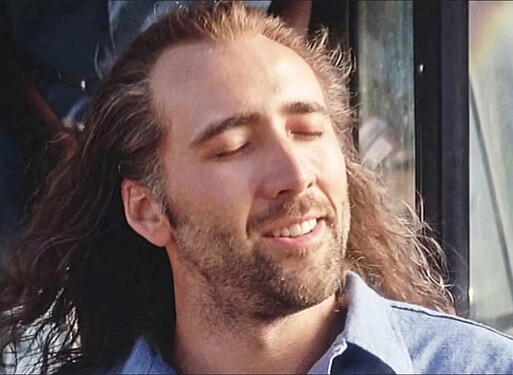Review of Megalopolis from a philosophy professor.
Brendan Myers · ·
Bren’s review of Megalopolis (2024, dir. Francis Ford Coppola.)
I’ll start by stating the obvious: this film is a dreamscape. Symbols abound in the actor’s gestures, in the set and costume design, in the colour palette, in the special effects. Every word of dialogue has at least two meanings: subtext, irony, and hidden agendas abound in every conversation. Everybody shows one face to one group of people, and another face to others. Surreal imagery, and non-sequitur editing, might leave some viewers bewildered.
But as I’ve been sitting with my thoughts and feelings about it for the last two hours, I think this film is an astonishing work of heart.
The core conflict is a three-way struggle, symbolized by the triangular windows in our protagonist’s workshop. In one corner there’s Caesar Catalina, an architect, and inventor of a science-fictional building material called Megalon. He represents a will to progress, to change, to imagine, to the future. In a second corner there’s the mayor of the city, Franklin Cicero, who represents a will to conserve things, to resist change, to keep things as they are. And in the third corner there’s Clodio Pulcher, a “rich kid”, the heir apparent to a banking dynasty, representing a will to destroy— so long as the destruction is fun for him to watch, and so long as he can protect himself from the consequences.
Creation, preservation, and destruction— three archetypes, three forces, three points of view, with which to craft a conversation about the nature of civilization itself.
But it would be all too easy to say these three forces are locked in epic struggle against each other. For these three forces are also implicated in each other: Catalina’s lover is the daughter of mayor Cicero, and Clodio is Catalina’s cousin. The conversation that the film calls for is complicated, difficult, uncomfortable, even metaphysical. No one here is morally pure. Not even Catalina. But by the same token, no one is excluded from the conversation either. Not even the villains.
It’s clear what the film denounces: consumerism, corruption, and greed. Less clear is what it affirms. For in the place of affirmations, the film poses questions: hard questions, smart questions, but also obscure questions. Sometimes it puts the questions with subtlety. In the Colluseum sequence, we witness a teenage pop star auctioning off her virginity to the highest bidder. And we see Clodio causing a massive public scandal, in part to destroy his cousin’s reputation, but in part because he thinks it’s fun. The whole sequence invites us to ask “Is this us? Are we really that decadent, that hateful, that self-absorbed, and that ridiculous? Are we Rome?”
Catalina’s unexplained ability to pause time itself is another symbol. While everyone around him chases the next thrill or the next power-grab, he’s the one who stops to think. He’s the one holding himself back from falling off a precipice— quite literally.
(Though I also wonder if this is Coppola’s way of saying that at 85 years old he’s running out of time to say all the things he wants to say. And as an aside, although I’m only 50, I know exactly what that’s like.)
In other cases the film poses its questions right in your face. In one scene Catalina asks if the way we’re living now is the only way available to us; in another, he proclaims to a crowd “We’re in need of a great debate about the future!” This is the thesis of the film. This idea of questioning is so bound to the DNA of this film that the characters themselves debate what questions can be asked and whether it’s not the right time to ask them.
And what do we get for answers? None, really; The movie is so packed with big questions that it doesn’t finish expressing one question before it rushes off to the next. It’s a movie that feels no special need to explain itself. It doesn’t care if you don’t understand it. And while I rather prefer films that try to answer their questions, still I think I get what Coppola’s trying to do here. He wants to start a conversation about the future that nobody right now wants to have. We live in cynical times. Misanthropy is fashionable. We prefer easy answers, like we prefer easy-to-understand movies. And we find it hard to think philosophical thoughts without turning them into memes, or declaring the thinkers themselves are assholes.
It’s also a dark movie. We see people deceive and manipulate each other in thoroughly shocking ways. There are some on-the-nose symbols to tell us who the bad dues are. But here’s the irony: the film’s shock moments are not nearly as shocking as what you might read in the news in any given week. Some of them were pulled straight from the headlines and pasted into the screenplay. Including the virginity auction. I get the impression that Coppola is angry about the state of our world. He’s angry that we’ve let it come to this.
But it’s also an optimistic movie. The Megalopolis of the film, the experimental city Catalina wants to build with his Megalon, is simply a place where people can ask questions together— also, where people can create things together, play together, and raise families. It ends on New Year’s eve, as Catalina’s Megalopolis opens to the public. This film looks humanity’s darkness in the eye but refuses to retreat into cynicism and misanthropy. It demands that we think better of humanity, better of being human.
In times like ours, I think it is incumbent upon artists to remind us that we can be better. Even to insist upon it. As Megalopolis does.
Though you have to sort through the surrealism to get it.

